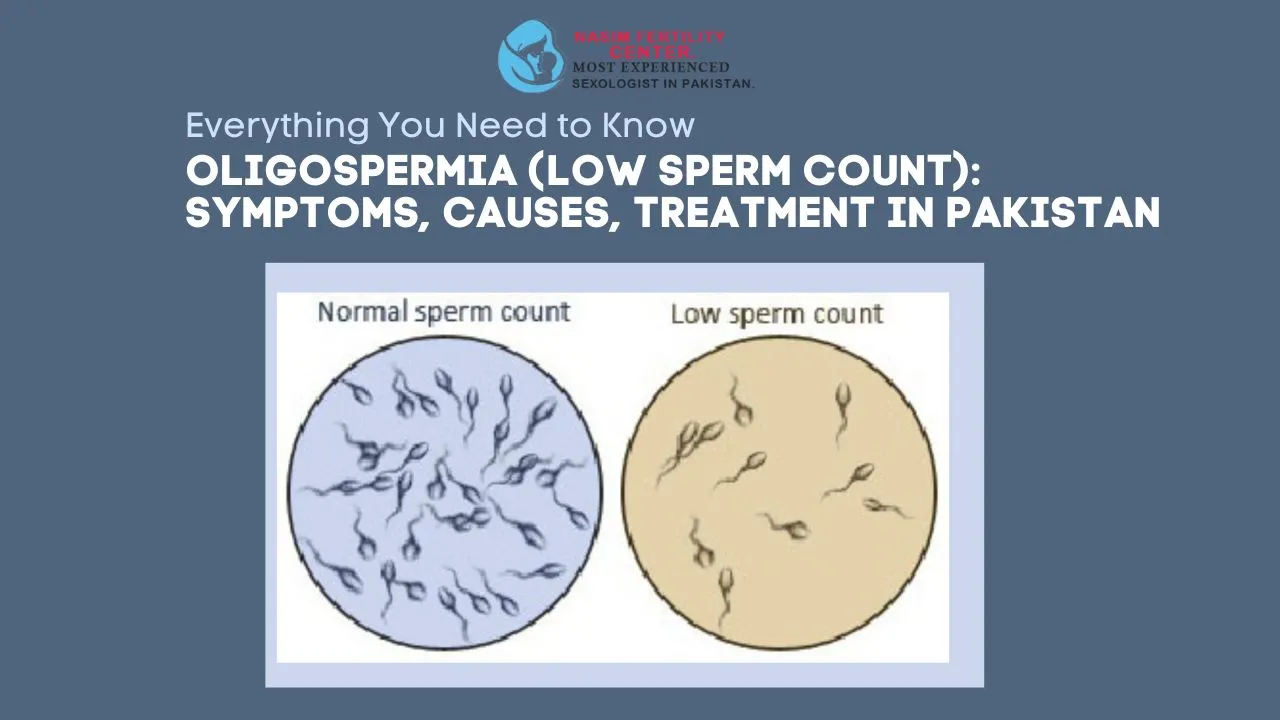
Oligospermia, also known as low sperm count, is a condition in which a man has fewer sperm cells in his semen than normal. This can lead to reduced fertility and difficulty in achieving pregnancy. Oligospermia can be caused by various factors, including hormonal imbalances, genetic issues, lifestyle factors, or underlying medical conditions.
In Pakistan, infertility affects a significant portion of the population, with studies estimating male infertility contributes to 30-40% of cases. Oligospermia is one of the most common causes of male infertility. Dr. Farooq Nasim Bhatti, a leading sexologist in Pakistan, specializes in treating male sexual health issues like oligospermia at his Nasim Fertility Center in Lahore, Faisalabad and Islamabad.
What is Oligospermia?
Oligospermia is a medical term that refers to a low concentration of sperm in a man’s semen. It is usually defined as fewer than 15 million sperm per milliliter of semen. Normal sperm counts range from 15 million to over 200 million sperm per milliliter. There are different degrees of oligospermia:
- Mild oligospermia: 10 to 15 million sperm/mL
- Moderate oligospermia: 5 to 10 million sperm/mL
- Severe oligospermia: 0 to 5 million sperm/mL
Oligospermia Meaning in Urdu
Oligospermia can significantly impact a man’s fertility and make it more difficult to conceive naturally. However, men with oligospermia may still be able to father a child, especially with fertility treatments.
In Urdu, “oligospermia” is referred to as “کمی منی” or “منی میں سپرمیٹازوا کی کمی,” which means a reduction in the concentration of sperm in the semen. This term highlights the low presence of sperm cells, which can impact fertility and the likelihood of conception. The Urdu meaning of oligospermia—translated as a decrease in “جرثومہ حیات کی تعداد” (sperm count)—is crucial for understanding male infertility issues in a cultural context, enabling those affected to seek specialized medical guidance and treatment in Pakistan.
Oligospermia vs Azoospermia
Oligospermia is often confused with azoospermia, another male infertility condition. However, they are distinct:
- Oligospermia means a low sperm count, with some sperm still present in the semen.
- Azoospermia means a complete absence of sperm in the semen.
While oligospermia can make it difficult to conceive, azoospermia makes it nearly impossible to father a child without advanced fertility treatments like testicular sperm extraction and IVF. Azoospermia is a more severe condition affecting about 1% of all men.
Also Read: Male Spermatogenesis
How Common is Oligospermia?
Oligospermia is a relatively common condition. Estimates suggest it affects about 10-15% of men globally. In Pakistan, studies have found low sperm count is a frequent cause of male infertility, accounting for up to 30% of cases. Risk factors that can increase the likelihood of developing oligospermia include:
- Older age
- Obesity
- Smoking
- Excessive alcohol use
- Exposure to toxins or chemicals
- Certain medications
- Varicocele (enlarged veins in the scrotum)
- Genetic disorders like Klinefelter syndrome
- Hormone imbalances
- Trauma or injury to the testicles
Causes of Oligospermia
Oligospermia can result from issues with sperm production or transport. Some of the potential causes include:
Lifestyle Factors
- Smoking cigarettes
- Heavy alcohol consumption
- Anabolic steroid use
- Illicit drug use like marijuana
- Malnutrition or vitamin deficiencies
- Exposure to toxins, pollutants, or heavy metals
Medical Conditions
- Varicocele
- Infections like sexually transmitted diseases
- Tumors in the testicles or adrenal glands
- Undescended testicles
- Autoimmune disorders
- Celiac disease
- Certain medications like chemotherapy drugs
- Radiation exposure or treatment
Hormonal Imbalances
- Hypogonadism (low testosterone)
- Hyperprolactinemia (high prolactin)
- Thyroid disorders
- Pituitary gland tumors or disorders
Genetic Causes
- Klinefelter syndrome
- Y-chromosome microdeletions
- Cystic fibrosis gene mutations
- Other chromosomal defects
In some cases, the exact cause of oligospermia may be unknown (idiopathic). A fertility specialist can run tests to determine the underlying factors contributing to low sperm count.
Symptoms of Oligospermia
The main sign of oligospermia is difficulty conceiving. There may be no other obvious symptoms. However, some men with very low sperm counts may notice:
- Decreased semen volume
- Reduced sex drive
- Erectile dysfunction
- Pain, swelling or a lump in the testicle area
- Decreased facial or body hair
Keep in mind many of these symptoms can have other causes. The only way to diagnose oligospermia is through a semen analysis.
Diagnosing Oligospermia
If you have been trying to conceive without success, a doctor may recommend a semen analysis to check for oligospermia. This test examines a sample of semen under a microscope to evaluate:
- Sperm count (concentration of sperm)
- Sperm motility (movement)
- Sperm morphology (shape)
- Semen volume
- Semen liquefaction
At least two semen samples taken a few weeks apart are usually assessed to account for natural variation. Other diagnostic tests that may be used include:
- Hormone testing to check testosterone, FSH, LH, prolactin levels
- Genetic testing for chromosomal defects
- Testicular biopsy to examine sperm production
- Scrotal ultrasound to look for varicocele
- Urinalysis to check for infections
A full medical history and physical exam are also important for determining the cause of oligospermia and the best treatment approach.
Treatment of Oligospermia
Treatment for oligospermia aims to improve sperm count and fertility where possible. The specific treatment depends on the underlying cause but may include:
1) Lifestyle Changes
- Quit smoking
- Limit alcohol intake
- Avoid hot tubs and saunas
- Maintain a healthy weight
- Eat a balanced diet
- Take multivitamins
- Reduce stress
2) Medications
- Antibiotics for infections
- Hormonal treatments to correct imbalances
- Medications to improve sperm production like clomiphene
3) Surgery
- Varicocele repair
- Vasectomy reversal
- Surgical sperm retrieval
4) Assisted Reproductive Technology (ART)
- Intrauterine insemination (IUI)
- In vitro fertilization (IVF)
- Intracytoplasmic sperm injection (ICSI)
The success of oligospermia treatment depends on factors like the severity of the condition, the underlying causes, the age of the couple, and the specific fertility treatments used. In general, men with mild to moderate oligospermia have a better chance of achieving pregnancy than those with severe oligospermia.
Why Consult Dr. Farooq Nasim Bhatti for Oligospermia Treatment in Pakistan
Dr. Farooq Nasim Bhatti is Pakistan’s leading sexologist and male infertility specialist. He is the first and only medical sexologist in Pakistan with degrees and certifications from prestigious institutions in the USA, Hong Kong, Malaysia, and China. At his Nasim Fertility Center locations in Lahore, Faisalabad, and Islamabad, Dr. Farooq Nasim Bhatti provides comprehensive, confidential treatment for male sexual health issues like oligospermia. He provides consultations as a top Sexologist in Pakistan, and best sexologist in Islamabad. Lahore and Faisalabad. He offers:
- Advanced diagnostic testing
- Personalized treatment plans
- Lifestyle counseling
- Hormonal therapies
- Surgical sperm retrieval
- Assisted reproductive technologies like IUI and IVF
With 30 years of experience, Dr. Farooq Nasim Bhatti MBBS, FAACS (USA), Diplomate of the American board of Sexology (USA), CST, HSC (Hong Kong), CART (MALAYSIA), CART (CHINA), has helped thousands of couples overcome infertility and achieve their dream of parenthood. His state-of-the-art facilities, expert team, and commitment to patient care make him the top choice for oligospermia treatment in Pakistan.
Frequently Asked Questions about Oligospermia
What is the meaning of oligospermia in Urdu?
In Urdu, oligospermia is called “کمی منی”. It refers to a low sperm count or decreased concentration of sperm in the semen2.
Can oligospermia be treated?
Yes, oligospermia can often be treated successfully. Treatment options include lifestyle changes, medications, surgery, and assisted reproductive technologies. The specific treatment depends on the underlying cause and severity of oligospermia.
Which drugs can cause oligospermia?
Certain medications can negatively impact sperm production and cause oligospermia. These include
- Chemotherapy drugs
- Anabolic steroids
- Opiates like methadone
- Some antibiotics
- Antidepressants
- Alpha blockers
- Anti-androgens
Always discuss the potential effects on fertility with your doctor before starting a new medication.
What is the range for oligospermia?
Oligospermia is typically defined as a sperm concentration below 15 million sperm per milliliter of semen. The normal range is from 15 million to over 200 million sperm per milliliter.
How is severe oligospermia treated?
Severe oligospermia, defined as less than 5 million sperm per milliliter, may require more intensive treatment. Options include surgical sperm retrieval combined with IVF and ICSI. Lifestyle changes, medications, and other fertility treatments may also help improve severe oligospermia.
What is the difference between oligospermia and azoospermia?
Oligospermia means a low sperm count, while azoospermia means a complete absence of sperm in the semen. Azoospermia is a more severe condition that makes it nearly impossible to father a child without advanced fertility treatments.
What is the best medicine for oligospermia in Pakistan?
The best medicine for oligospermia in Pakistan depends on the specific cause. Treatment may include antibiotics, hormonal medications, or drugs to stimulate sperm production. Consult with a qualified fertility specialist like Dr. Farooq Nasim Bhatti to determine the most effective medication for your individual case.
Conclusion
Oligospermia is a common cause of male infertility in Pakistan. While it can make conceiving more difficult, oligospermia is often treatable. Lifestyle changes, medications, surgery, and assisted reproductive technologies can significantly improve sperm count and fertility potential.
If you are struggling with oligospermia or infertility, don’t hesitate to seek help. Consult with a qualified fertility specialist like Dr. Farooq Nasim Bhatti to diagnose the problem and develop a personalized treatment plan. With the right approach, you can overcome oligospermia and achieve your dream of fatherhood.

Dr. Farooq Nasim Bhatti (MBBS, FAACS – USA, Diplomate: American Board of Sexology, CST, HSC – Hong Kong, CART – Malaysia & China) is a qualified medical sexologist with 30+ years of experience. He has presented 21+ research papers internationally and treats sexual dysfunction through sex therapy, counseling, and pharmacotherapy to restore natural sexual function without temporary medication.

Regain Confidence with Our ED Solutions
Explore effective treatments for erectile dysfunction. Take charge of your intimacy today.


